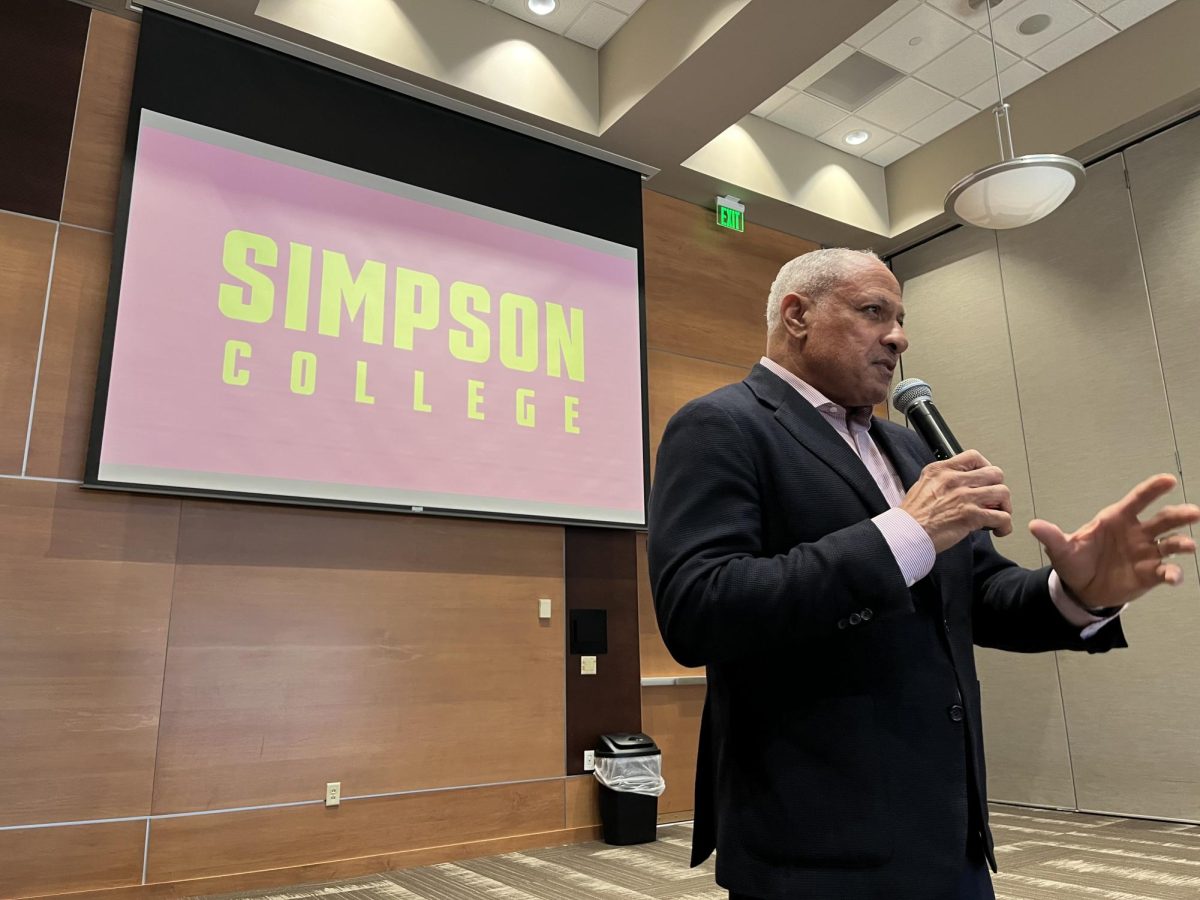Attendance policy enforcement leads to dismissal of junior SGA senator
November 28, 2007
Simpson’s Student Government Association is looking to improve its attendance policy after the recent dismissal of a class senator.
Junior Lisa Fiene was dismissed from SGA on Oct. 31 after missing five meetings. According to the senate’s bylaws, senators may miss no more than two meetings per semester. After the second absence, the senator will be removed from office.
Fiene is also a member of the women’s soccer team and missed five meetings because of conflicting games.
She said she was disappointed with how the situation was handled. According to Fiene, two senators who violated the absence policy were dismissed last semester after a vote by the entire student senate.
This semester, senators did not get a chance to vote on whether or not Fiene should be dismissed. Instead, Fiene received an e-mail saying that she was no longer a member of SGA.
Fiene did admit to having missed five senate meetings. However, she said that isn’t the really issue at hand.
“I missed the meetings,” Fiene said. “SGA did what they were supposed to do. The problem is bylaws were interpreted differently this specific time, in my case.”
Junior Kyle Liske, student body vice president, said the current policy was put into place last year after problems arose from senators consistently missing meetings.
“We did have an attendance policy prior to that,” Liske said. “It wasn’t being enforced and it wasn’t being followed. We revised it last year and we came up with this.”
Currently, members are only allowed two absences, but are able to appeal emergency absences to the internal affairs committee of SGA.
The committee, made up of a class president and one senator from each class, works to ensure that the senate runs smoothly.
Amanda Yanchury, sophomore class president and head of the Internal Affairs Committee, said emergency absences include such things as illness or a funeral.
“It does not include sporting events, forums or events like that,” Yanchury said.
She also said that while she didn’t tell people outright what the exact attendance policy was, she did ask them to read the SGA constitution at the beginning of the year.
“As soon as I found out I was in charge of Internal Affairs I said, ‘everybody read your constitution and by laws,'” Yanchury said. “I thought they could take it upon themselves.”
Fiene said she does understand the rule, especially after having voted for it as a member of SGA last year, and feels having such a policy does not align with the ideas that Simpson promotes.
“I feel that the attendance policy is counterproductive to what a liberal arts school like Simpson represents,” Fiene said. “The policy penalizes you for being involved and representing your school in a different organization. We go to a Division III school. We should be able to participate in everything.”
Rich Ramos, assistant dean of student activities and adviser for SGA, said that the decision to dismiss someone from the organization is a difficult one.
“Nobody wants to kick somebody off,” Ramos said. “Nobody wants to penalize somebody because they’re involved in something else on campus. By the same token, we have to have some way to ensure that the business of the group is able to get done.”
Ramos noted that SGA will meet approximately 10-11 times this semester.
“As an elected representative in that body, people are expecting them to be there and make decisions,” Ramos said. “I appreciate that students want to be involved in a number of different things, but there’s still an expectation that you have to have some commitment to this group.”
Junior Carl Rowles agrees with Ramos.
“My personal belief is if you’re going to make a commitment, you have to do it fully,” Rowles said. “We expect our senators to be there and do their work on behalf of us. When she’s not at meetings, she can’t do that.”
Ramos said that, as the bylaws stand now, things could be misunderstood.
“Last year when we were writing this, there were some lengthy meetings going over everything,” Ramos said. “There was never any real consensus as to what certain absences, such as athletics, fell under. I think what happened was because people didn’t want to be terribly hard on their peers and their friends, the constitution and the bylaws got a little bit diluted.”
Liske defends the use of executive power to remove Fiene from SGA.
“Essentially what you have is executive privilege,” Liske said. “According to the constitution, the president executives must make sure that what the senate passes is executed to the full extent. The attendance policy being a piece of legislation that was passed last year, the executives have the authority to enforce that.”
He also stated that the choice to dismiss Fiene was not an easy one.
“This decision was very difficult, and nobody likes to kick anybody out of an organization, but Lisa took an oath to ‘preserve, protect and defend the constitution’ of Simpson college,” Liske said. “We felt that if we weren’t fully enforcing legislation, we weren’t fully doing our job and we would be letting down our constituents.”
Yanchury said that the Internal Affairs Committee is currently reviewing the policy to see how it can be improved. The committee is trying to more clearly define what absences may be excused and how to appeal any absences that may occur.
According to Ramos, SGA will hold an election to fill the vacant senate spot.
Fiene, who had been a member of SGA for more than two years, said she will not run again.
“I believe in SGA, or I wouldn’t have spent my time doing it,” Fiene said. “But there’s an issue of what message we are giving with this attendance policy, that people should be limited to the activities they participate in.”




